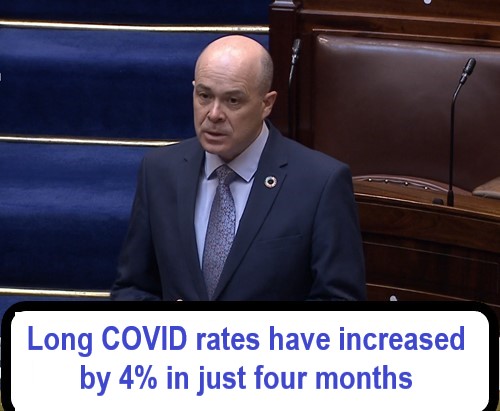Speech by Denis Naughten TD
to the
Policy Forum for Ireland keynote seminar:
Tackling long COVID in Ireland – priorities for services, strategy development, and research
On 19th March 2020, I stood up in Dáil Éireann, pointing out that we would have to deal with the public health challenges associated with the SARS-CoV-2 virus for at least 12 months.
TDs snickered at me, as did at least some of those advising the Government. I got the same response when I highlighted the emerging problem of long COVID 16 months later.
And from online patient forums, it was clear that many patients felt that the established medical profession was not taking these concerns seriously.
They were not being believed: Even just getting the recognition that this was not all in their heads was so important. As one patent put it: I spend 90% of my time in bed with Long Covid; it’s debilitating – I feel forgotten by the Government.
While data was emerging internationally on the prevalence of long COVID, no national data was available here in Ireland. And “what’s not measured is not managed.”
As a result, I started analysing the Social Welfare claims data for Covid-19 claims, which showed that 0.8% of those who contracted Covid-19 and claimed the enhanced illness benefit payment were medically certified as unfit to work 12 weeks later. That figure excludes people who have relapsed after initial recovery and the many thousands who are still employed but struggling with the illness.
But this was just a small cohort of the population.
It’s a big problem
So, I have commissioned two national opinion polls on the self-declared incidence of long covid. Now wearing my scientific hat, I would take ‘self-declaration’ polls with a pinch of salt.
But an analysis that I published in the Irish Medical Times in February on the first poll; shows that it correlates very well with published academic studies and the only empirical long covid data that I have gleaned from social welfare claims.
The second such poll that I published recently, four months after the first poll, found that 10% of adults have experienced symptoms of long COVID following an initial infection with the virus. This correlates with the lower incidence rate in a Nature Review article published last month.
The poll results also show that 12% of women reported having experienced symptoms, compared with 7% of men – these figures correlate quite well with the University of Washingtons School of Medicine study across 53 countries that suggests that females are twice as likely as males to experience long COVID.
Now the concerning thing about these two polls is that there has been a 4% increase in just four months in the adult population in Ireland self-declaring the symptoms of long Covid. So, this problem is not going away and getting bigger!
Investment in the future
While there is now a global recognition of long COVID as a chronic condition, I believe here in Ireland a perception that this is a short-term problem. We are told that 90% of people fully recover after 12 months. This is concerning because, from a policy perspective, it sends a message that this is a temporary problem and will disappear.
The welfare data shows that one-third of workers on disability payments due to Covid-19 are out of work for at least six months.
It is also clear to me that post-viral infections are now implicated in increasing chronic conditions, including ME/CFS, Multiple Sclerosis, Parkinson’s Disease, Lyme Disease and Alzheimer’s disease.
Therefore, establishing patient-focused health infrastructure, such as regional long-COVID multidisciplinary clinics, would not only cater for the growing need of long COVID patients today and in the months and maybe years ahead. But in the medium term, these clinics could focus on other post-viral conditions which are growing in prevalence.
Today, we have a unique opportunity to build the first-ever multidisciplinary network of regional health teams embedded with primary and community care from a blank sheet: no hidden agendas, no internal politics.
And this is at the core of what we all want the Sláintecare reform to deliver. Let’s make the management of long-Covid a template for health service reform!
Denis Naughten TD, is Chairperson of the Inter-Parliamentary Union Working Group on Science and Technology and the Cathaoirleach of the Joint Oireachtas Committee on Social Protection
References:
Second National poll on incidence of long COVID: https://denisnaughten.ie/2023/04/06/second-national-poll-on-long-covid/
Article published in Irish Medical Times: https://denisnaughten.ie/2023/03/06/long-covid-opinion-poll-supports-findings-of-separate-research-and-data-on-incidence/
Welfare data analysis: https://denisnaughten.ie/2023/01/17/over-1-3rd-of-long-covid-welfare-claimants-are-out-of-work-for-over-6-months-naughten/
Nature Review article on long COVID https://www.nature.com/articles/s41579-022-00846-2#:~:text=Long%20COVID%20(sometimes%20referred%20to,%2DCoV%2D2)%20infection.
University of Washington’s School of Medicine study, WHO (2022): https://www.who.int/europe/news/item/13-09-2022-at-least-17-million-people-in-the-who-european-region-experienced-long-covid-in-the-first-two-years-of-the-pandemic–millions-may-have-to-live-with-it-for-years-to-come
